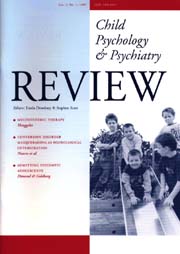Crossref Citations
This article has been cited by the following publications. This list is generated based on data provided by Crossref.
Frith, Uta
1999.
Paradoxes in the definition of dyslexia.
Dyslexia,
Vol. 5,
Issue. 4,
p.
192.
Dockrell, Julie
and
Lindsay, Geoff
2000.
Meeting the needs of children with specific speech and language difficulties.
European Journal of Special Needs Education,
Vol. 15,
Issue. 1,
p.
24.
Wasik, Barbara A.
Bond, Mary Alice
and
Hindman, Annemarie
2002.
Section Two: Educating At-Risk Students from Preschool through High School.
Teachers College Record: The Voice of Scholarship in Education,
Vol. 104,
Issue. 10,
p.
89.
Share, David L
and
Shalev, Carmit
2004.
Self-teaching in normal and disabled readers.
Reading and Writing,
Vol. 17,
Issue. 7-8,
p.
769.
Blischak, DM
Shah, SD
Lombardino, LJ
and
Chiarella, K
2004.
Effects of phonemic awareness instruction on the encoding skills of children with severe speech impairment.
Disability and Rehabilitation,
Vol. 26,
Issue. 21-22,
p.
1295.
Klassen, Robert M.
Neufeld, Paul
and
Munro, Fiona
2005.
When IQ is Irrelevant to the Definition of Learning Disabilities.
School Psychology International,
Vol. 26,
Issue. 3,
p.
297.
Svensson, Idor
and
Jacobson, Christer
2006.
How persistent are phonological difficulties? A longitudinal study of reading retarded children.
Dyslexia,
Vol. 12,
Issue. 1,
p.
3.
Truman, Amanda
and
Hennessey, Neville W.
2006.
The locus of naming difficulties in children with dyslexia: Evidence of inefficient phonological encoding.
Language and Cognitive Processes,
Vol. 21,
Issue. 4,
p.
361.
Sparks, Richard L.
Humbach, Nancy
and
Javorsky, James
2008.
Individual and longitudinal differences among high and low-achieving, LD, and ADHD L2 learners.
Learning and Individual Differences,
Vol. 18,
Issue. 1,
p.
29.
Cuetos, Fernando
2009.
Dislexias evolutivas: un puzzle por resolver.
Revista de Logopedia, Foniatría y Audiología,
Vol. 29,
Issue. 2,
p.
78.
Russak, Susie
and
Saiegh-Haddad, Elinor
2011.
Phonological awareness in Hebrew (L1) and English (L2) in normal and disabled readers.
Reading and Writing,
Vol. 24,
Issue. 4,
p.
427.
Mundy, Ian R.
and
Carroll, Julia M.
2012.
Speech prosody and developmental dyslexia: Reduced phonological awareness in the context of intact phonological representations.
Journal of Cognitive Psychology,
Vol. 24,
Issue. 5,
p.
560.
KUPPEN, SARAH
HUSS, MARTINA
and
GOSWAMI, USHA
2014.
A longitudinal study of basic auditory processing and phonological skills in children with low IQ.
Applied Psycholinguistics,
Vol. 35,
Issue. 6,
p.
1109.
Russak, Susie
and
Saiegh-Haddad, Elinor
2017.
Phonological awareness errors mirror underlying phonological representations: Evidence from Hebrew L1 – English L2 adults.
Second Language Research,
Vol. 33,
Issue. 4,
p.
459.
Layes, Smail
Lalonde, Robert
and
Rebai, Mohamed
2019.
Effects of an Adaptive Phonological Training Program on Reading and Phonological Processing Skills in Arabic-Speaking Children With Dyslexia.
Reading & Writing Quarterly,
Vol. 35,
Issue. 2,
p.
103.
Oh, Se Jin
Yim, Dongsun
and
Sung, Jee Eun
2019.
A Meta-Analysis of the Event-Related Potential during Auditory Processing in Infants with Familial Risk for Dyslexia and Its Correlation to Language Abilities.
Communication Sciences & Disorders,
Vol. 24,
Issue. 4,
p.
837.
Myers, Brett R.
Lense, Miriam D.
and
Gordon, Reyna L.
2019.
Pushing the Envelope: Developments in Neural Entrainment to Speech and the Biological Underpinnings of Prosody Perception.
Brain Sciences,
Vol. 9,
Issue. 3,
p.
70.
Huo, Shuting
Wu, Ka Chun
Mo, Jianhong
Wang, Jie
and
Maurer, Urs
2022.
Children With Chinese Dyslexia Acquiring English Literacy: Interaction Between Cognitive Subtypes of Dyslexia and Orthographies.
Journal of Learning Disabilities,
Vol. 55,
Issue. 3,
p.
229.
Shin, Hye Won
2024.
Instructional task modality and teacher effects on L2 vocabulary learning: Evidence from adolescent learners.
Language Teaching Research,


